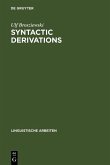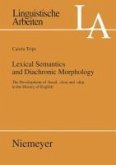What factors govern women's and men's use of syntactic alternatives? This is the central issue explored in the present volume, which provides the most comprehensive account so far of gender differences in syntax. By drawing on the theoretical frameworks of functional grammar (cf. Givón 1984, 1990), cognitive semantics and pragmatics, the book is able to show that the underlying characteristic of syntactic constructions that are sensitive to gender lies in their ability to encode epistemic meaning. Paying due attention to the closely intertwined relation between gender and a range of internal and external determinants, the present volume shows how apparently contradictory results in previous research can be reconciled. The internal and external factors investigated are: semantic type, position, intonation, pragmatic function - style, power, surreptitiousness, group composition.
The Labovian 'Vanguard of Change' and 'Linguistic Conformity of Women' Principles (Labov 2001) are supplemented by an 'Epistemic Modality Principle' (stating that women are more prolific users of epistemic downtoners than men) and a 'Turn-Allocation Principle' (assessing that women use more completion signals than men in the negotiation of floor-apportionment). These principles are crucial in paving the ground for an explanation of gender differences in language. This volume is essential reading for those interested in language and gender and in how functionalism can be brought to bear in illuminating language structure and use.
Dieser Download kann aus rechtlichen Gründen nur mit Rechnungsadresse in A, B, BG, CY, CZ, D, DK, EW, E, FIN, F, GR, HR, H, IRL, I, LT, L, LR, M, NL, PL, P, R, S, SLO, SK ausgeliefert werden.
"By means of her formal and espescially functional in-depth analysis, [Mondorf] is not only able to resolve some contradictions of previous research, but also to provide linguistics with a valuable theoretical framwork for further research on the subject."
Marion Matschi in: York University, Languages and Literatures 1/2006









